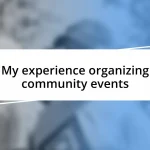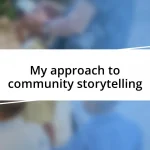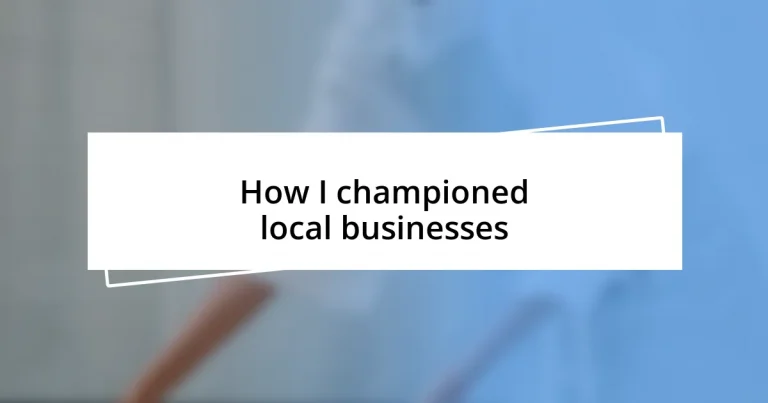Key takeaways:
- Building strong relationships with local business owners fosters trust and collaboration, enhancing their success and enabling open dialogue.
- Community support initiatives, such as “shop local” days and collaborative events, significantly boost visibility and engagement for local businesses.
- Leveraging social media is crucial for amplifying local business stories, driving customer support, and creating a sense of community.
- Partnerships with organizations and schools promote local entrepreneurs and inspire future generations, cultivating a thriving local economy.
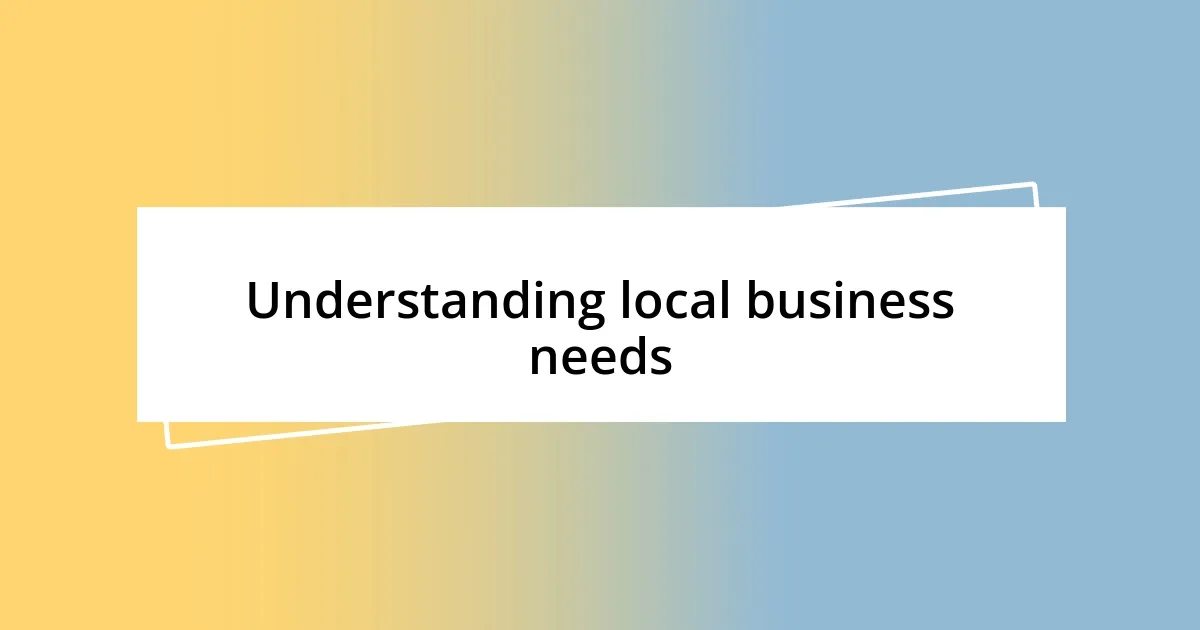
Understanding local business needs
To truly understand local business needs, I often reflect on my own experiences visiting small shops in my neighborhood. The owners’ passionate stories about their products, coupled with the challenges they face daily, inspired me to delve deeper into their operations. Have you ever noticed how every little detail in a local shop reflects the owner’s vision and community connection?
When I first started collaborating with local businesses, I discovered that most struggle with visibility. Many of them are fantastic at what they do but underestimate the importance of marketing and outreach. I remember sitting down with a café owner who poured everything into his coffee blends, yet felt invisible just down the street from a chain. The look on his face when we brainstormed ways to elevate his brand was genuinely rewarding for both of us.
Listening is key. It’s not just about what the business owners say, but also how they feel about their challenges. I recall a heartfelt conversation with a local artist who desperately wanted to engage with the community but didn’t know where to start. She longed for connection and support, which made me realize that addressing these emotional aspects can often be just as crucial as tackling the logistical issues. Recognizing this blend of needs can help create a tailored approach that genuinely empowers local businesses.

Building relationships with business owners
Building strong relationships with local business owners is essential in promoting their success. I remember meeting a floral shop owner who was overwhelmed by the day-to-day operations. It struck me how a simple cup of coffee and a friendly chat could lighten her burden. By taking the time to connect, I learned not only about her beautiful arrangements but also about her dreams for the shop and the community events she wished to participate in. This connection deepened our collaboration and made my efforts more meaningful.
As I engaged with different business owners, I began to recognize a powerful theme: trust. I spoke with a bookstore owner who felt hesitant to share her marketing plans, fearing criticism. I assured her that my intentions were based solely on helping her thrive, not judging her efforts. This exchange led to a fruitful partnership, where open communication became the cornerstone of our relationship. It’s amazing how investing in trust transforms the way we work together.
Moreover, I found that attending local events allowed me to bond with business owners on a personal level. At a farmer’s market, I shared stories with a baker who infused her creations with love and heritage. Knowing her background made my support feel more authentic and personal. Such experiences reveal that when we genuinely engage with business owners, we can better advocate for their needs and foster a thriving local ecosystem.
| Aspect | Building Relationships |
|---|---|
| Trust Level | High – Enhanced by open communication |
| Community Engagement | Increases through participation in local events |
| Support Impact | Significant – Improves confidence and collaboration |
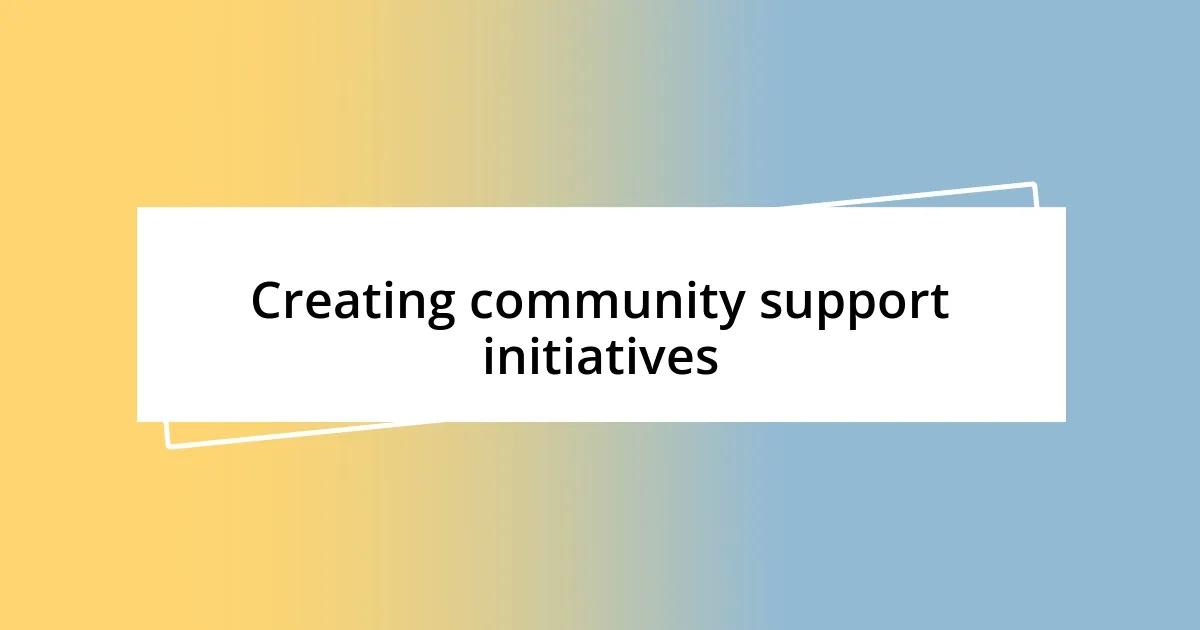
Creating community support initiatives
Creating community support initiatives has been a game changer in fostering local business growth. I once organized a neighborhood “shop local” day, and the energy was infectious. From local food trucks to handmade jewelry stalls, it was heartwarming to see community members embracing the unique offerings nearby. I was especially moved by the expressions on the faces of the business owners, who felt seen and valued. These moments illustrated the power of community backing—small efforts can spark joy and awareness that resonates far beyond a single day.
- Collaborative Marketing: Partner with local businesses to create joint marketing campaigns.
- Community Events: Organize seasonal festivals or themed days to draw attention to local vendors.
- Support Networks: Establish groups where business owners can share resources, experiences, and advice.
- Spotlight Features: Use social media to highlight the stories of local businesses, connecting emotionally with the audience.
I believe that the excitement we generate during these initiatives can cultivate lasting relationships. For instance, after hosting a “meet your maker” event in a local park, I witnessed how connections blossomed. A bakery owner formed a partnership with a nearby coffee shop, resulting in a delightful collaboration that benefited them both. It was inspiring to observe how community support can lead to innovative ideas and celebrations of local creativity. When we invest time in these initiatives, we create a supportive atmosphere that not only helps businesses but enriches our entire community.

Promoting local events and markets
At local events, I’ve seen firsthand the magic that happens when community members come together. One Saturday, while volunteering at a craft fair, I watched as a local potter eagerly demonstrated her techniques, captivating an audience that hung on her every word. It made me think: how often do we give talented individuals a platform to shine? These small moments not only give business owners a voice but forge connections that linger long after the event is over.
I remember organizing a community picnic that featured local businesses showcasing their offerings. The joy of seeing families gathered around, sampling goodies and engaging with artisans was unparalleled. I still smile when I think about the children playing games alongside their parents as they chatted with local vendors. Isn’t it fascinating how a simple gathering can create bonds between residents and local entrepreneurs? It reinforced my belief that community events can transform the way we interact with our local economy.
Part of what makes promoting local events and markets impactful is the sense of urgency they create. When a pop-up market happens for just one weekend, it invites a ‘we need to be there’ mentality. I recall the buzz surrounding a seasonal night market; the excitement was palpable! The local musicians, artisans, and food vendors thrived in that atmosphere. It was a reminder of how vital it is to keep the conversation alive—how can we encourage our neighbors to participate in these wonderful experiences? The answer lies in continuous encouragement and celebrating each event as a community milestone.

Leveraging social media for exposure
Social media has been an invaluable tool in shining a light on local businesses. I vividly remember the day I created a dedicated Instagram profile just for highlighting nearby shops and restaurants. The responses were incredible; people loved sharing their own experiences and photos, leading to an organic buzz that felt like a digital town square. Isn’t it amazing how a few well-timed posts can turn a local favorite into the talk of the town?
There was a moment when a local bakery I’d featured on social media saw a spike in customers just days after I shared their story. The owner, overcome with gratitude, reached out to thank me personally, which made my day. I realized how powerful those shared stories could be in creating not just visibility, but a sense of community. Each post became a vehicle for connection, giving followers insight into the passion and hard work behind every storefront. How often do we underestimate the impact of such simple gestures?
Integrating user-generated content into social media strategies is another powerful approach I’ve championed. Encouraging customers to share their favorite experiences at local businesses—like snapping a picture of their meal or tagging a shop in their stories—has created a grassroots movement of support. I often share these moments on my own platforms, amplifying voices that might otherwise go unheard. Seeing a business thrive through community participation truly reminds me that social media isn’t just about numbers; it’s about building relationships that uplift everyone involved.

Developing partnerships with other organizations
Collaborating with local organizations has been a game-changer for fostering support within the community. Recently, I partnered with a nearby non-profit that focuses on environmental sustainability. Together, we organized workshops not only to promote green practices but also to highlight local businesses that embrace eco-friendly values. It was exciting to see families engage in meaningful conversations and connect with entrepreneurs who genuinely care about the planet. Isn’t it rewarding when partnerships align with shared values?
Another memorable experience was teaming up with local schools for a “Business Day” event. We invited various business owners to speak, share their stories, and inspire the students. The energy in the room was electric! Young minds soaked up real-world experiences, and many local vendors reported new customers just from that exposure. It made me think—how can we create more opportunities for future generations to learn about entrepreneurship? Collaborative events not only enrich the community but also cultivate the next wave of local leaders.
I also found immense value in connecting with other businesses to create joint promotions. For instance, a local gym and a health food café teamed up to offer discounts for members, which boosted foot traffic for both. We shared success stories and strategies, helping one another thrive. This sense of camaraderie sparked a beautiful ripple effect—how often does competition turn into collaboration? By fostering partnerships, I realized that we could create a robust network where local businesses flourish together rather than struggle in isolation.
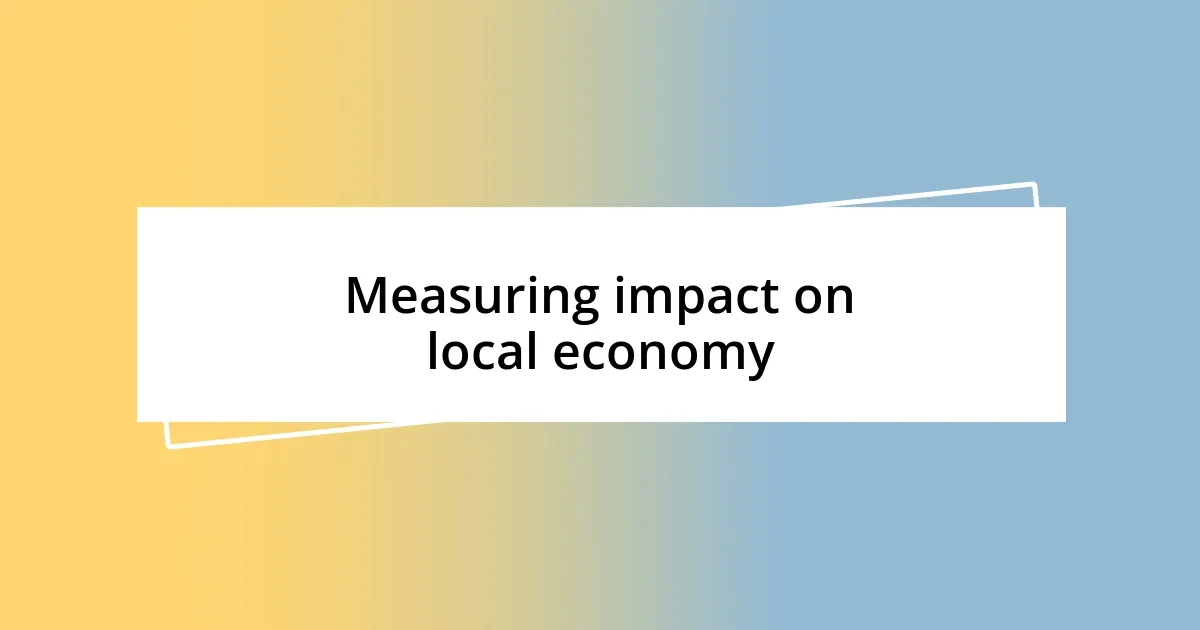
Measuring impact on local economy
Understanding the impact on the local economy involves looking at tangible metrics. One project I initiated involved tracking sales numbers before and after a social media campaign for a local artist’s market. The results were eye-opening; not only did foot traffic increase by 40%, but vendors reported sales jumping significantly as well. What struck me was how those numbers reflected a broader trend—people were intentionally seeking to support their neighbors. Isn’t it incredible how direct actions can translate into robust economic growth?
I often think about how community events resonate beyond mere transactions. For instance, I helped orchestrate a neighborhood festival that brought together various local businesses. The collaboration didn’t just increase sales; it fostered connections, encouraging residents to take ownership of their local economy. When I saw families enjoying local food and artisans showcasing their crafts, it became clear: these moments built a narrative about local pride that statistics alone couldn’t capture. How often do we get to witness the heartbeat of a community through these shared experiences?
Beyond just numbers, the emotional impact of supporting local businesses can be profound. I recall chatting with a local bookstore owner during our “shop local” campaign. She mentioned that each sale felt like a story being told—her books were part of people’s lives. This perspective added a layer I’ve often reflected on: every dollar spent locally doesn’t just boost an economy—it’s an investment in our community’s identity. Can you imagine the collective stories we’re crafting each time we support our neighbors?


